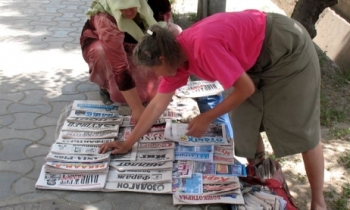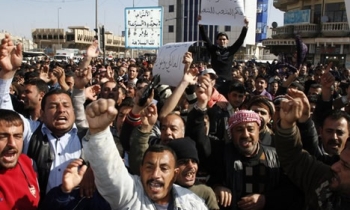British Broadcasting Corporation (BBC) has announced plans for its biggest transformation in 70 years it is closing down 10 of its foreign language radio services to pay for an Arabic channel that will be launched in 2007. The move comes amid a mad scramble for the Middle East television market.

The channel, which will initially be broadcast to a region stretching from western Africa to Iraq 12 hours daily and employ 148 people, is BBC's first publicly funded global TV service. It is part of a £30 million restructuring of the World Service and is being funded by the closure of the 10 foreign language services and the loss of 218 jobs.
The World Service provides news in English and 42 other languages (including the 10) and is funded by a Foreign Office grant. The 2005-06 grant is £239 million and the Arabic service is expected to cost £19m a year in operating costs. The Foreign Office had reportedly insisted that the cost of the new project be met from existing resources.
"The changes add up to the biggest transformation of BBC World Service that has been undertaken and one of the most far-reaching since BBC began international broadcasting more than 70 years ago," BBC World Service Director Nigel Chapman said at a press conference in London on Tuesday.
Incidentally, BBC's first foreign language radio service launched in 1938 had been in Arabic. BBC also operates an Arabic online service, bbcarabic.com. "There is a clear demand for an Arabic television service from BBC, based on its widespread radio audience of 12 million weekly listeners," said Hosam El Sokkari, head of the BBC Arabic Service, at the press conference.

BBC's Arabic TV service will compete for viewers with commercial satellite broadcasters like Aljazeera and Al-Arabiya, as well as the US government-funded Al-Hurra. Aljazeera, the television service based in Qatar, had announced in July this year that it will launch an English language service next year. Earlier this month, veteran British broadcaster Sir David Frost joined Aljazeera. Sir David is to appear on Aljazeera International, the pan-Arab news network's new English-language channel.
BBC had entered the Arabic television market in 1994, in collaboration with a Rome-based company linked to the Saudi royal family, Orbit Communications. The marriage ended two years later following acrimonious disputes over editorial control. The same year Aljazeera launched, based in Qatar, and recruited a number of former BBC Arabic staff members. Aljazeera has been time and again accused by the United States of being partisan in its coverage of US-led invasion of Afghanistan and Iraq.
"That experience does not negate the need for an independent news and information channel in Arabic from the BBC, as some have argued. It tells us instead we had the wrong funding model and means of distribution," Chapman said. He denied that the Arabic channel is being launched to serve as a diplomatic arm of the government. "There's no political motive in this," he said. "Our job is to be a broadcaster."
Surveys have shown the World Service reputation for objectivity fell in the Arab world during the Iraq war, but has since improved. Listener numbers have also risen in countries such as Iraq, Iran and Afghanistan during the past year.

BBC's reality check in Eastern Europe has provided different results. "Many of the European services being closed had their roots in the Second World War and have served their audiences well right through the Cold War years," Chapman said. BBC will end radio broadcasts in Bulgarian, Croatian, Czech, Greek, Hungarian, Kazakh, Polish, Slovak, Slovene and Thai by March 2006. In all, 236 jobs will be cut as a result of the restructuring proposals, of which 218 are in the language services.Online services in these languages, however, will not be discontinued.
"But Europe has changed, fundamentally, since the early 1990s. Now the countries to which these languages are broadcast are members of the EU (European Union), or are likely to join soon." He said the need for BBC radio service has declined in most of these countries because of a growth of independent media and an increase in the number of English-speakers in the areas served.








